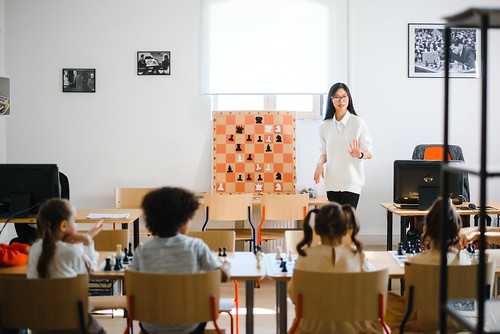Using Games to Enhance Teachers' Professional Training and Growth
“Games make learning a necessity to have fun. So there’s no better motivation for kids to learn than to teach the concept with a game.” – Kara Carrero.
Games are more than just a source of entertainment. They have shown to have potential in boosting the professional training and growth of teachers. One great instance is the use of game-based learning (GBL). GBL allows teachers to incorporate games into their lessons. This does not only involve playing existing games but also creating new ones tailored for specific classroom needs. By doing this, teaching becomes an active engagement rather than passive implantation. Such an approach lightens up the atmosphere and reduces stress on both ends - teacher and student; resulting in a conducive environment perfect for effective learning. Here are some games that can be used for this purpose:

Games: reshaping the world of learning
Games are widely seen as fun and entertainment. Yet, they can play a much deeper role in the field of teacher's professional growth. This is most evident in bingo games. They possess an accentuated focus on cognitive enhancement and social skills development. Bingo games, at their core, are about recognition and reward. When adapting them for professional development, especially for teachers, they can serve as engaging tools to help reinforce learning and to encourage participation. Bingo requires memory and sharpness of thought for it asks participants to remember letters and numbers in order to win. It strengthens their concentration skills, which teachers need when dealing with students. In essence, this game also reinforces teamwork among educators since sharing techniques are usually involved. It is a great tool for mastering vocabulary and math as well.
Puzzle Swap: The Ultimate Brain Teaser Game
Teachers sometimes need a refresher course. Not in their teaching subjects, but on ways to enhance their skills and practice collaboration. One excellent way is through games like 'Puzzle Swap'. In Puzzle Swap, teachers get divided into groups. Each group receives a different puzzle for assembly. The trick, however, lies with the pieces; they're mixed amongst all puzzles across all groups. Imagine it as an interactive treasure hunt where you have not only to find your treasure but also to negotiate its return from pirates who might use your pieces for their results. This game breeds more than just fun. It instills crucial skills of collaboration and problem solving among teachers – much-needed classroom attributes that can prepare them for any challenge students may present during typical school days.
Digital game-based learning: Unlock knowledge through fun
Who says education needs to always be serious? Imagine a digital platform where teachers navigate virtual classrooms filled with different student personalities. Teachers interact with these characters, facing diverse classroom scenarios that call upon their problem-solving skills, creativity and emotional intelligence. Such platforms are not fanciful ideas but robust tools providing first-hand experiences without real-world consequences and cultivate essential skills like critical thinking and social understanding under enjoyable circumstances while increasing motivation due to its engaging nature.
Enhancing teacher's expertise takes new heights when intertwined creatively with aspects of gaming fostering holistic growth which would reflect positively upon both student engagement during classes along with academic performance ultimately. Imagine, educators all over the world equipped not just with instructive skills but also an invigorating level of creativity sparked through engaging games? Such innovation could result in more active learning environments leading to students brimming with concentration, cognitive ability and social skills.
-

- Log in to post comments


















